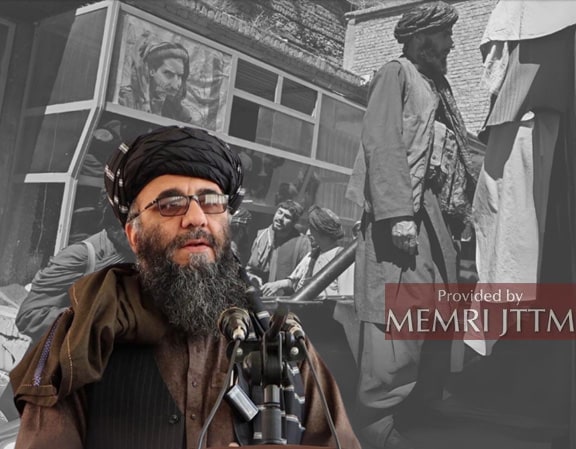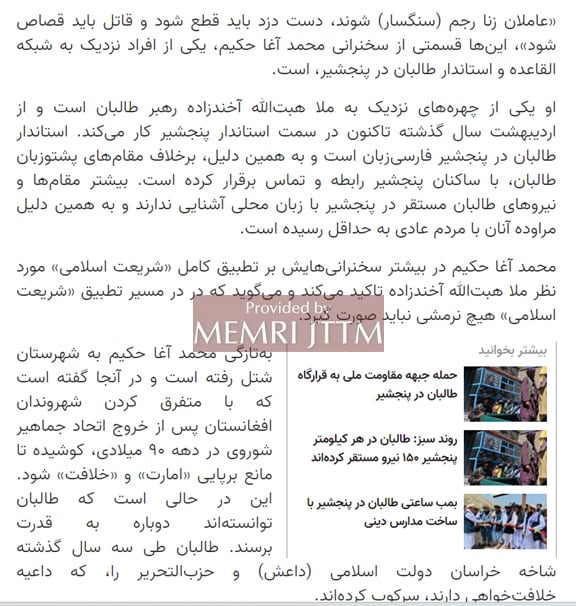The following report is now a complimentary offering from MEMRI's Jihad and Terrorism Threat Monitor (JTTM). For JTTM subscription information, click here.
A Dari-language report published by an Afghan media outlet revealed that Mohammad Hakim Agha, the Afghan Taliban's governor of Panjshir province, has a close relationship with Al-Qaeda and has been advocating a strict version of Islamic shari'a punishments.
The article, titled: "The Taliban Governor In Panjshir Promotes Violence And Religious Extremism," notes that in most of his speeches during visits to various districts of Panjshir, Mohammad Hakim Agha has been urging residents, who are mostly anti-Taliban, to send their children to madrassas where they will be instructed according to jihadi teachings.

Following is a summary and translation of the report.
Mohammad Hakim Agha, the Taliban governor of Panjshir province, has been demanding the enforcement of shari'a punishments, the report said: "Perpetrators of adultery should be stoned, the hands of thieves should be cut off, and murderers should be subject to retribution,' these are parts of a speech by Mohammad Hakim Agha, a close associate of the Al-Qaeda network and the Taliban governor in Panjshir."
He is one of the figures close to Mullah Hibbatullah Akhundzada, the leader of the Afghan Taliban, and is a Dari-language speaker. For this reason, unlike the Pashto-speaking Taliban officials, he has established relations and contact with the residents of Panjshir. According to the report, he "emphasizes in most of his speeches the full implementation of the Islamic shari'a in accordance with Mullah Hibbatullah Akhundzada's vision, stating that there should be no leniency in the process of implementing Islamic shari'a."
The report reads, "Recently, Mohammad Agha Hakim has gone to the Shotul district [Panjshir province] where he stated that by dividing Afghan citizens after the withdrawal of the Soviet Union in the 1990s, efforts were made to prevent the establishment of an 'Emirate' and 'Caliphate.' ... Over the past three years, the Taliban have suppressed the Khurasan branch of the Islamic State (ISIS) and Hizb-ut-Tahrir, which claim to advocate for the caliphate."
He makes multiple trips to the districts of Panjshir and urges the residents of this province to support the commands of Mullah Hibbatullah Akhundzada and not to allow any person or group to rise up against the Taliban. The report continues: "The Taliban regime is concerned about the expansion of armed resistance against them, with the National Resistance Front and the Freedom Front carrying out guerrilla attacks... Mohammad Agha Hakim has explicitly stated in his speeches that those involved in any 'uprising against the Taliban' will be severely suppressed."

A screenshot of the report.
A report from the United Nations Security Council's Analytical and Monitoring Team indicated that there is a weapons depot belonging to Al-Qaeda's network in Panjshir. "It is believed that this weapons depot was set up with the knowledge of Mohammad Agha Hakim, because he is suspected of collaborating with Al-Qaeda network," the report says. According to the Doha Agreement, the Taliban committed to fighting Al-Qaeda and refusing any terrorist group use of Afghan soil to launch terror attacks. However, Ayman Al-Zawahiri, the leader of al-Qaeda, was targeted in a U.S. drone strike in Kabul on July 30, 2022, revealing that the Taliban welcomes Al-Qaeda leaders on Afghan soil.
The report states further: "Mohammad Agha Hakim is trying to recruit youth from Panjshir for the ranks of the Taliban army and police... the Taliban governor in Panjshir has made significant efforts to promote religious extremism. He frequently attends the inaugurations of religious madrassas [Islamic religious seminaries] and asks people to send their children and teenagers to these religious madrassas. He previously said that 18 madrassas had been opened in Panjshir in the past year.
"Most residents of Panjshir oppose Taliban ideology, but sending children and teenagers to Taliban-controlled madrassas leads to them being taught an extremist version of Islam, preparing them to become a new generation of recruits in the future.
"During two decades of war and rebellion against the previous government of Afghanistan and its Western allies, the Taliban primarily recruited their forces from mosques and religious madrassas in Afghanistan or the Tribal Areas of Pakistan, especially in Khyber Pakhtunkhwa. Now, however, Mohammad Agha Hakim, under the directive of the group's leader, is seeking to train a portion of their required forces in madrassas, including those in Panjshir."
The full text of this post is available to subscribers.
Please login or register to request subscription information from MEMRI





